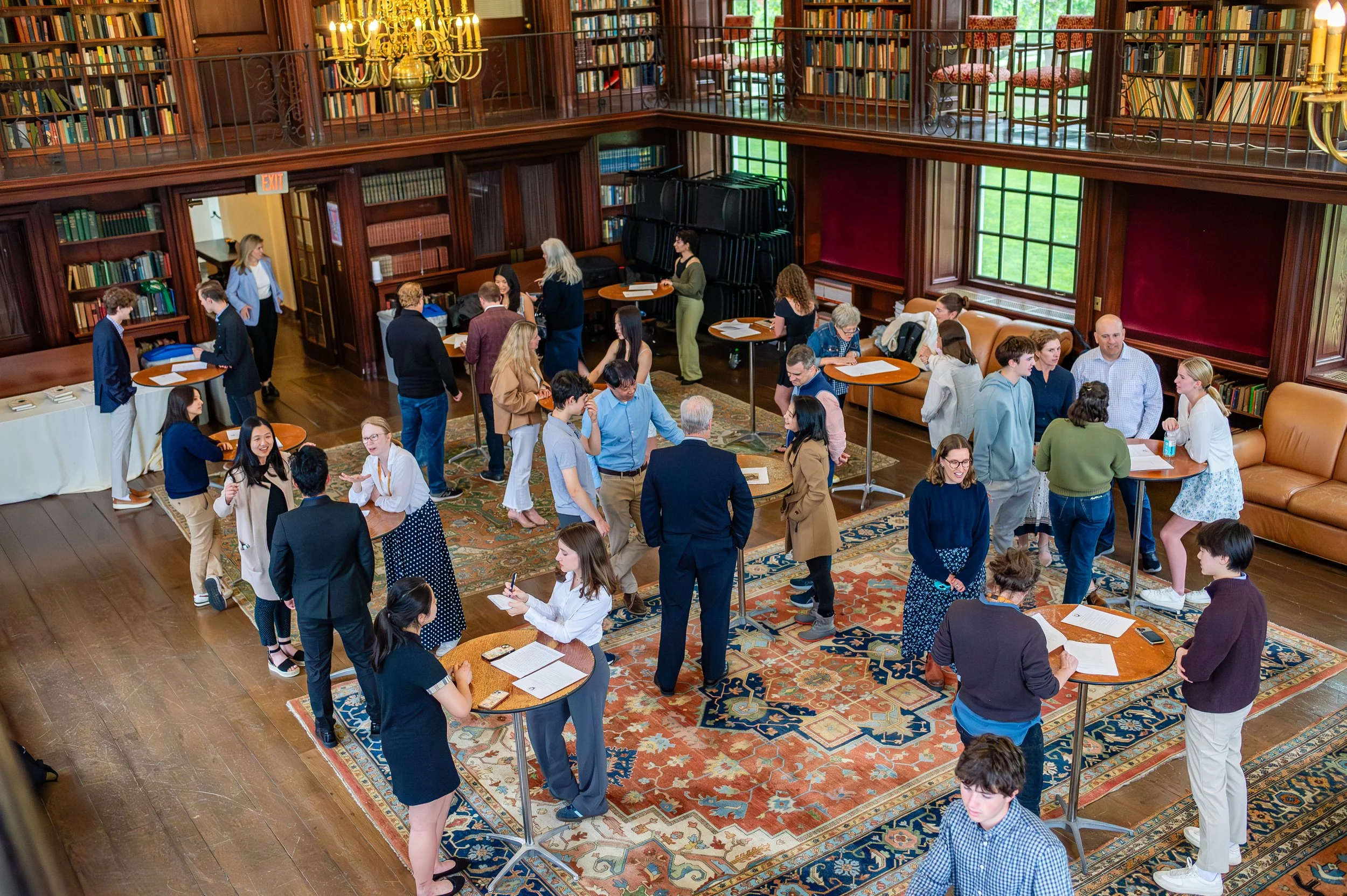Bisbee Tea Highlights Student Excellence in History
Bisbee Tee 2025
By Vivienne Mockenhaupt ‘27
On May 20, 2025, the doors of Straus Library opened to a steady stream of students, teachers, and family, all there to celebrate one another’s accomplishments in the forty-second year of the Ethan Bisbee Tea and Social Science Forum. The History and Social Sciences Department uses the Bisbee Tea to recognize what it deems the most outstanding research projects of the U.S. History class and the social science electives.
Founded in 1983, the Bisbee Prize, named for former faculty member Ethan Wyatt Bisbee, honors the highest-quality research paper from each section of U.S. History. According to Joshua Emmott, chair of the History and Social Sciences Department, Bisbee expressed a belief that the research paper was “at the core of what historians do and should be at the core of what Milton history students are doing.” He then developed his own criteria for thesis, argument, research, process, and writing. 2023 marked the addition of the very first Social Science Forum, allowing prizes to go to projects covering the United States while not in the formal U.S. History course. This year, the department also chose to recognize students for their final projects in the courses American Government and Economic Inequality, which ranged from a comparative analysis of paid parental leave policies to a study of the role of money in American politics.
Standing at individual circular tables with only the printed copies of their papers, the prizewinners spent nearly two hours explaining the intricacies of their research to the Milton community. The Bisbee Tea welcomes anyone interested in the historical work of the awarded students and anyone associated with Milton. Emmott explained that the choice to open the event to the public was a relatively new one; previously, the Bisbee Tea had functioned as a series of privately held presentations in Wigglesworth 304. The Straus reception features a display of books awarded to prize-winning authors; this year, teachers chose to give either Abundance, by Ezra Klein and Derek Thompson, and Murder in a Mill Town by Bruce Dorsey.
Many of this year’s prizewinners echoed Emmott’s claims that a Bisbee-worthy paper reflected passion and curiosity about a topic not discussed in the U.S. History course content itself. “While researching for my Class IV paper, I examined the United Fruit Company’s monopolistic grip over Guatemala—how it controlled vast tracts of land, manipulated labor practices, and ultimately influenced U.S. foreign policy,” Stella Tjan ‘27 said of the origins of her Class III U.S. History paper, which focused on America’s role in the coercive adoption of Guatemalan children. Tjan added, “as a student in U.S. History this year, I wanted to pursue a topic that remained rooted in Guatemala while also unmasking a lesser-known chapter of American policy.” Meanwhile, Benjamin Wang ‘27 drew the topic of his paper, which focused on religious resistance and deindustrialization in Youngstown, Ohio, a former area of steel production, from an in-class reading on Andrew Carnegie, leading him to research steel production. Wang also derived his topic from his own interest in the United States’ shift from being a “big production country a century ago to such a tech giant.”
Winner Elizabeth Sim ‘27 highlighted the value of all U.S. History student contributions, reminding the community that “each paper has its own value, and just because someone’s [paper] received a prize doesn’t mean that another paper is… less interesting or less insightful.” Sim expressed concern about the one-per-class policy potentially keeping other worthy papers from receiving the same recognition. Emmott disagreed with Sim’s assertion that many per class might merit the Bisbee Prize. “Doing good work is an expectation” at Milton, he said, especially given the pressures of prizes and college applications. “Not everyone’s good work, though, is award-worthy.” He emphasized the need for students to adjust to the possibility of not winning but still producing an excellent paper.
Emmott also cited a multitude of students who hoped to send their work out on submission to the Concord Review and other journals that accept the historical research of high schoolers. Wang and Joanna Zhang ‘27, among others, discussed their hopes to submit their papers to publications beyond Milton, although Zhang does not intend to expand her work, hoping instead to “let this be the end of the road for now” and submit what she has already written. As a continuation of the passion and drive that Emmott described, some winners wished to pursue change and spread awareness on their topic long after the Straus doors closed for the day: Sim explained that she hopes to look into modern movements for Irish Americans and participate in activism where necessary, while Tjan expressed that the work she began with this paper “feels too important and underreported to leave behind.”
